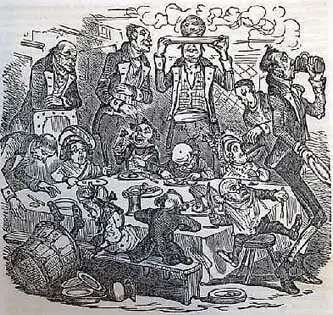Very happy and content.
As happy as a sandboy
What's the meaning of the phrase 'As happy as a sandboy'?
What's the origin of the phrase 'As happy as a sandboy'?
American readers will probably be more familiar with ‘as happy as a clam‘, which originated in the USA in the 19th century. The Australian version is ‘as happy as Larry‘, which (probably) originated there. Other creatures that are reputedly more than usually happy are ‘larks’, ‘dogs with two tails’ and ‘pigs in ***’.
The word ‘sandboy’ brings to mind images of a child playing on the beach, making sand-castles and the like. In fact, sandboy was the name of those who delivered sand to public houses, theatres and homes in the 18th and 19th centuries. Children were used in that trade, but most sandboys were adults. This use of ‘boy’ has frequently been used for low-status male workers, as in tea-boy, barrow-boy, house-boy etc.
The use that the sand was put to was as a crude floor covering – a precursor to sawdust in what later became known as ‘spit and sawdust’ establishments – public spitting wasn’t then reviled as it is now.
The earliest printed citation of the phrase that I can find is from Pierce Egan’s Real Life in London, 1821:
“…appeared to be as happy as a sand-boy, who had unexpectedly met with good luck in disposing of his hampers full of the above-household commodity. “
Charles Dickens made an oblique reference to the variant form of the phrase, ‘as jolly as a sand-boy’, in his 1840 novel The Old Curiosity Shop, in which the inn The Jolly Sandboys features. The original printing of the book included etchings, one of which shows the ‘sandboys’ in party mood. Dickens describes the place like this:
“The Jolly Sandboys was a small road-side inn of pretty ancient date, with a sign, representing three Sandboys increasing their jollity with as many jugs of ale”.
Carting sand may have been hard and dusty work, but the sandboys’ reputation for happiness seems more straightforward than with clams or ‘Larry’ – they were often intoxicated.
See other ‘as x as y similes‘.
The history of “As happy as a sandboy” in printed materials
Trend of as happy as a sandboy in printed material over time
Related phrases and meanings
Browse more Phrases
About the Author

Phrases & Meanings
A-Z
A B C D E F G H I J K L M N O P Q R S T UV W XYZ
Categories
American Animals Australian Bible Body Colour Conflict Death Devil Dogs Emotions Euphemism Family Fashion Food French Horses ‘Jack’ Luck Money Military Music Names Nature Nautical Numbers Politics Religion Shakespeare Stupidity Entertainment Weather Women Work
How did we do?
Have you spotted something that needs updated on this page? We review all feedback we receive to ensure that we provide the most accurate and up to date information on phrases.
